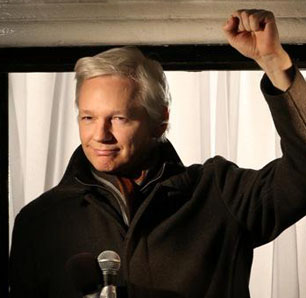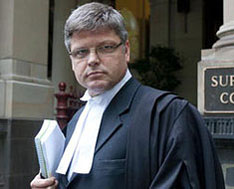Can Julian Assange win a seat in the Australian Senate (and what will happen if he does) ??
Apr 30th, 2013 | By Greg Barns | Category: In BriefFrom Greg Barns, National Campaign Director for the Wikileaks Party’s 2013 Australian federal election campaign:
Tom Flanagan, Stephen Harper’s old ideological chum, once said of Wikileaks founder Julian Assange that he wouldn’t mind if Mr Assange were assassinated. “I think Obama should put out a contract or use a drone or something. I wouldn’t feel happy, uh, unhappy, if Assange disappeared,” Flanagan said in 2010.
Flanagan retreated from this position a short time later but his initial sentiments reflected those of the loony right in North America, about the man who has lifted the lid on the United State and its allies and their misconduct in Afghanistan and Iraq over the past decade.
Mr Flanagan would no doubt be none too pleased if Julian Assange were to be elected to the Australian upper house, the Senate, in that country’s September 14, 2013 general election. But current polling suggests that despite Assange’s being holed up in the Ecuadorean Embassy in London, where has sought asylum after losing a court battle to prevent his extradition to Sweden, he might indeed win a seat.
And his fledging Wikileaks Party, established earlier this year and with over 1,200 members and supporters to date, might win senate seats as well in Western Australia and New South Wales where it is also running senate candidates.
Under the Australian electoral system each state has 12 senators and generally half are up for election every three years. To be elected a candidate needs to obtain 14.9 precent of the vote which is done either by winning votes directly, or by way of a flow of preferences from other parties. Some minor party and independent candidates in the Australian senate are elected with a tiny direct vote of around 2 percent, but preferences from other parties pushes that vote over the 14.9 percent mark.
Currently polling has support for Assange in the mid-20s in Victoria where he is intending to head the Wikileaks’ Party ticket. In New South Wales the Party is polling around the same numbers and it’s slightly lower in Western Australia.
* * * *
Support for Assange traverses the political landscape in Australia. The Wikileaks values of libertarianism, transparency, and greater protection for citizens against the post 9/11 state, coupled with a view among many Australians that Canberra has preferred to cosy up to Washington rather than look after one of its own citizens, is driving some of the support for Assange and the Wikileaks Party
And the injection of Assange and Wikileaks into a decidedly lowest common denominator approach being taken by the Australian Labor Party and Prime Minister Julia Gillard, and the Liberal-National Party coalition and its leader Tony Abbott, is providing relief for voters.
If Assange is elected to the Australian Senate speculation abounds on whether or not he would be subjected to a challenge by a losing candidate. It’s possible. As is the possibility that the Australian government refuses to find a diplomatic and political solution to allow Assange to return to Australia to take up his seat.
Julian Assange and the Wikileaks Party is, as one political watcher observed to me recently, making exciting what is an otherwise boring election campaign. Or as that former Australian Prime Minister with a wicked turn of phrase, Paul Keating, might have put it, “it will be thrills and spills all the way to polling day.”
Australian lawyer and policy consultant Greg Barns was a political adviser to the Howard government in Canberra from 1996 to 1999. He was the director of the Australian Republican Movement’s 1999 referendum campaign and he succeeded Malcolm Turnbull as ARM chair in 2000. He is a director of the human rights group, Rights Australia, a director of the Australian Lawyers Alliance, and a member of the Australian Defence Lawyers Alliance.
Greg Barns has written three books on Australian politics. He also comments on Australian (and other including Canadian) politics in such digital and other publications as Crikey, The Drum, and the South China Morning Post. And his work has appeared in such Canadian publications as the Globe and Mail, the Toronto Star, and (we’re very pleased to note) right here on the counterweights website. He played a leading role in the 2010 documentary film, The Trial – which tells the “inside story of Australia’s biggest terrorism trial.” He was appointed national campaign director for Julian Assange’s new Wikileaks Party in Australia a few weeks ago, early in April 2013.



